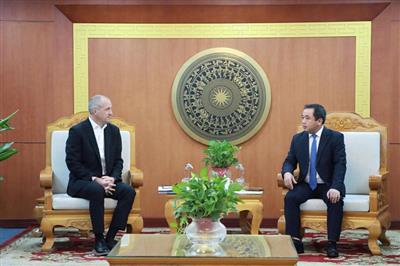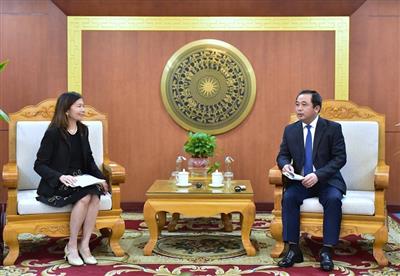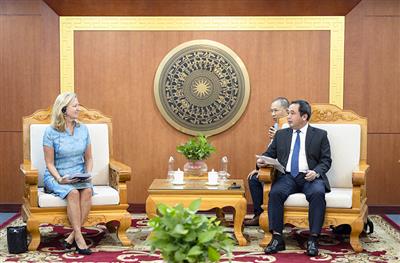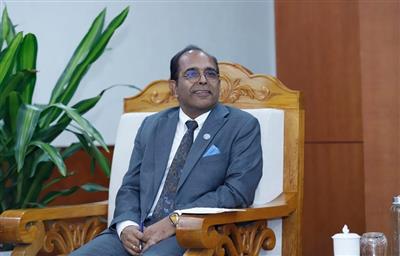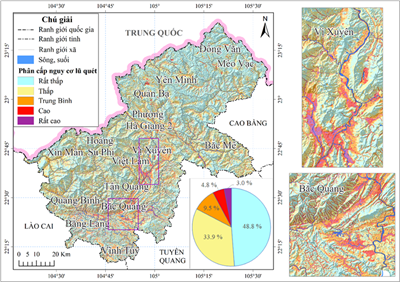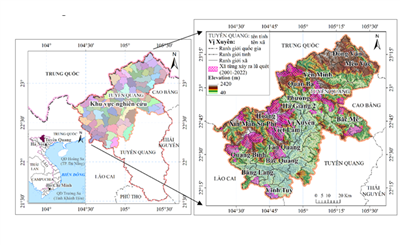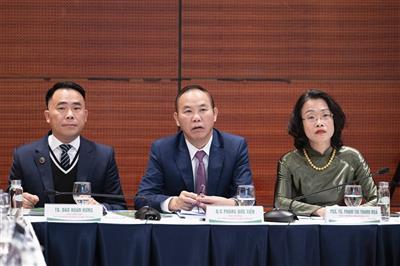
Laying the groundwork for sustainable agriculture: Vietnam consults on national soil health strategy
20/05/2025TN&MTOn May 19 in Hanoi, in light of escalating land degradation and the growing impacts of climate change, the Ministry of Agriculture and Environment of Vietnam (MAE), in collaboration with the Food and Agriculture Organization of the United Nations (FAO), convened a national consultation workshop on the draft ‘Soil health strategy and action plan’. The event was held under the framework of the FAO-funded project “Support for the development of a national soil health strategy and action Plan,” with MAE as the lead agency, the Vietnam Academy of Agricultural Sciences (VAAS) as project coordinator, and the Institute of Agricultural Environment serving as the implementing body. The workshop marked a pivotal first step in the development of a national policy on soil health, aiming toward an ecological, sustainable, and climate-resilient agricultural sector.
Toward comprehensive and sustainable soil health management
With more than 11.6 million hectares of agricultural land—6.7 million hectares dedicated to annual crops and 4.9 million hectares for perennial crops—land is an invaluable asset to Vietnam’s agriculture. However, soil quality is increasingly under threat. Statistics show that 60% of agricultural land is affected by erosion, with 30% experiencing severe erosion losses exceeding 20 tons per hectare per year. Approximately 44% of agricultural land has been degraded to varying degrees, with common types of degradation including erosion, drought, hardpan formation, salinization, and acid sulfate contamination.
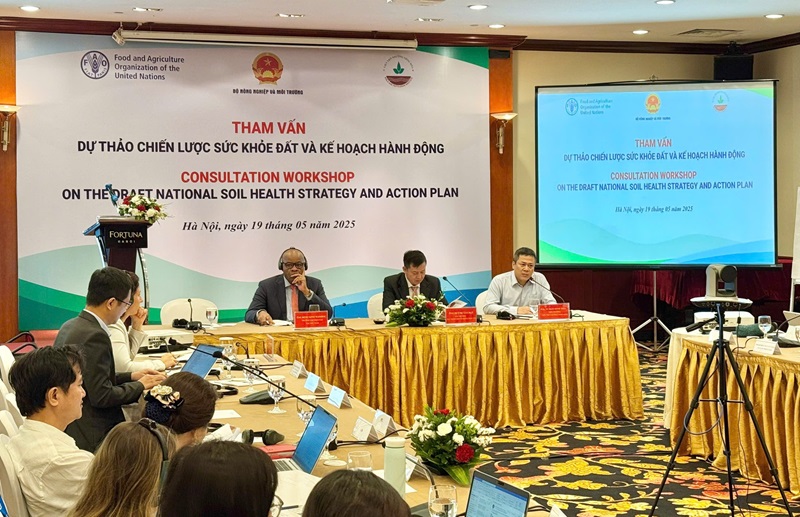
In light of escalating land degradation and the growing impacts of climate change, the Ministry of Agriculture and Environment of Vietnam (MAE), in collaboration with the Food and Agriculture Organization of the United Nations (FAO), convened a national consultation workshop on the draft ‘Soil health strategy and action plan’.
In addition, nutrient depletion is a critical concern in many farming areas: 70% of agricultural soils have a pH below 6.0, 50% are deficient in nitrogen, 70% in phosphorus, and 60% in potassium. Soil salinization is also becoming increasingly evident in the Mekong Delta. Heavy metal pollution from arsenic and copper—particularly in rice-growing areas and near landfill and industrial waste sites—is further exacerbating the problem.
Speaking at the event, Mr. Huynh Tan Dat, Director general of the Department of Crop production and plant protection, emphasized that Vietnam still lacks a comprehensive national program on soil health and plant nutrition. Although a basic legal framework exists, it remains insufficient: concrete guidelines are lacking, databases are fragmented, and policy support is still largely aspirational. “Developing a national soil health strategy and action plan is essential to safeguarding soil resources—the foundation of a sustainable food system,” Mr. Huynh Tan Dat affirmed.
The draft Soil health strategy (2022–2030) and action plan (2022–2026) are expected to provide a strong policy framework to promote sustainable farming, enhance the efficient use of agricultural inputs, protect soil biodiversity, and reduce greenhouse gas emissions. The strategy also aligns with the “One health” approach, which underscores the interdependence of healthy soil, plants, animals, and people in achieving sustainable development goals.
A strategic framework for sustainable soil management
Mr. Rémi Nono Womdim, FAO Representative in Vietnam, stated: “Soil is at the heart of the food system. If well-managed, it can store carbon, maintain fertility, and improve the productivity and quality of agricultural outputs.” He reaffirmed FAO’s commitment to supporting the Vietnamese Government in developing and implementing this strategy, while sharing international best practices and innovative approaches to land management.
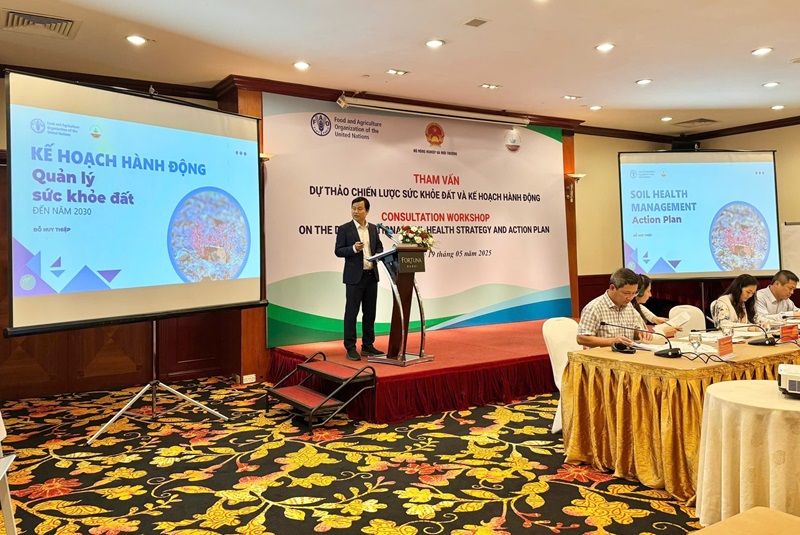
he May 19 consultation was not only a policy dialogue, but also a collective commitment to protecting soil resources—starting today, to secure a sustainable future for Vietnamese agriculture and its people
Under the project, FAO has assisted Vietnam in evaluating the 2010–2020 soil health management plan, drafting a new strategic framework, and integrating international recommendations to align with the country’s ecological agriculture goals.
By 2030, Vietnam aims to complete a national database on soil quality, establish a soil health classification system suited to its diverse ecological zones and in line with international standards, and implement sustainable farming models that optimize fertilizer use, reduce nutrient losses, and build the capacity of both officials and farmers.
Looking toward 2050, Vietnam envisions becoming a regional leader in soil health and plant nutrition management. To realize this goal, Mr. Huynh Tan Dat highlighted the need for support from the international community, private sector, development partners, and the scientific community in mobilizing resources, technology, and knowledge.
From a public health perspective, Dr. Pham Duc Phuc, a One health expert, warned of soil-related human health risks, such as antibiotic residues and antimicrobial-resistant bacteria. He stressed the importance of developing an integrated data system to enable early risk detection and effective environmental management.
The National soil health strategy is not merely a technical document for the agriculture sector—it is a foundation for a sustainable ecosystem, a healthier society, and a competitive agricultural economy. The May 19 consultation was not only a policy dialogue, but also a collective commitment to protecting soil resources—starting today, to secure a sustainable future for Vietnamese agriculture and its people.
Ngoc Huyen


